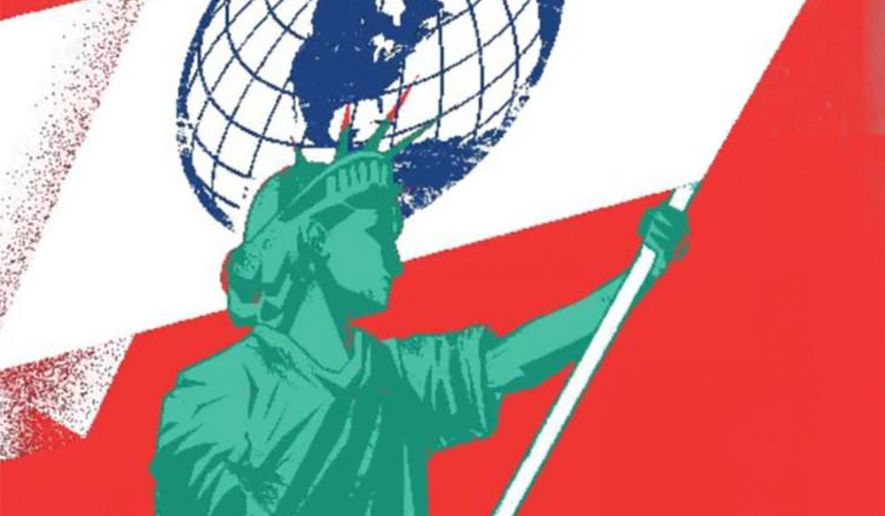OPINION:
In this already stormy century, freedom has many powerful enemies, and few powerful defenders.
That’s not just my impression. “Freedom in the World 2021,” a study recently released by Freedom House, documents “heavy new losses” in the “struggle against authoritarian foes, shifting the international balance in favor of tyranny.” It reports, too, that 2020 “marked the 15th consecutive year of decline in global freedom.”
If you care about the outcome of this struggle, you should at least know the names and stories of some of those risking — and in too many cases sacrificing — their lives to keep the flickering flame of liberty from being extinguished.
High on my list is Aleksei Navalny, the most significant opposition figure in Russia. Last week, he sent word from prison that he was beginning a hunger strike to protest the government’s refusal to provide him adequate medical treatment.
The pain in his back and legs could be the result of the time he has spent in cramped jail cells and “defendant’s cages.” Another likely factor: lingering effects of Russian government agents having “tried to kill me with a chemical weapon,” as he phrased it in a letter.
Last August, on a flight from Siberia to Moscow, he fell into a coma. Friends spirited him to Germany where doctors concluded he had been poisoned with Novichok, a Soviet-era military-grade nerve agent.
The German doctors managed to save him, and, in January, he returned to Moscow where he was immediately arrested and sentenced to 3½ years in prison for having failed to show up for a parole appointment during the time he was convalescing in Germany.
On Monday night, it was reported that he was suffering from respiratory problems and fever and had been transferred to the prison’s medical ward. He sent word that he would continue his hunger strike nonetheless.
Move on to Hong Kong, where Beijing’s boot is stamping on the faces of thousands of freedom fighters, Jimmy Lai and Martin Lee prominent among them. The former is a 72-year-old media tycoon who could be spending his fortune sipping craft cocktails on a white-sand beach. The latter is an 82-year-old attorney who has advocated compromise with China’s Communist rulers and opposed violence.
On Thursday, both were jailed for their participation in a demonstration that drew 1.7 million people in 2019 — a protest against Beijing’s flagrant violation of the 1984 Sino-British Joint Declaration.
Under that treaty, Britain agreed to hand its colony over to Communist China in 1997 — without a plebiscite to determine how the people of Hong Kong preferred to be governed. In exchange, China’s rulers pledged that for at least 50 years Hong Kongers would not be deprived of the freedoms to which they had become accustomed.
Foreign policy sophisticates throughout America and Europe pointed to this “one country, two systems” agreement as a shining example of what could be achieved through diplomatic engagement with authoritarians.
Next, we go to Lebanon, now a failing state thanks largely to Hezbollah, an armed Shia militia, designated terrorist organization, and proxy of the Islamic Republic of Iran. Lokman Slim, a Lebanese patriot, himself a Shia, boldly criticized and challenged Hezbollah — until February, when he was gunned down.
Secretary of State Antony Blinken issued a statement saying the U.S. joined “the international community in calling for his killers to be brought to swift justice.” That call, you will be unsurprised to learn, has gone unanswered.
Zach Hanley, an American who had been Mr. Slim’s friend and assistant, noted in Al Arabiya last week that “both the low-level operatives who pulled the trigger and the decision-makers at the top of the terrorist organization involved, continue to live freely and laugh in the face of justice and accountability, while the Lebanese state rolls over.”
Within the borders of Iran over recent years, millions of people have risked death, torture and imprisonment to stand up to the Islamist dictatorship. Ruhollah Zam, the son of a cleric, was a journalist who documented those protests. Fearing the wrath of Iran’s rulers, he fled to France where he was granted asylum.
Last year, he visited Iraq where he was detained — it’s unclear by whom — and then shipped off to Iran. In December, he was convicted of “corruption on earth” — a crime whose definition is elastic — and hanged.
The EU condemned the killing “in the strongest terms.” The French government called his execution “unacceptable.”
To appreciate how meaningless those words are, consider that last Friday, the EU, France and Germany, in concert with Russia and China, amicably discussed with officials of the Islamic Republic how to get President Biden to rejoin the Joint Comprehensive Plan of Action, the deal providing the theocrats with billions of dollars in exchange for promises to slow-walk their nuclear weapons programs for a few years.
Freedom House notes that proponents of authoritarianism — including those within democratic states — “are both cheering the breakdown of democracy and exacerbating it, pitting themselves against the brave groups and individuals who have set out to reverse the damage.”
“Governments that understand the value of democracy, including the new administration in Washington, have a responsibility to band together to deliver on its benefits, counter its adversaries, and support its defenders,” Freedom House urges. “They must also put their own houses in order to shore up their credibility and fortify their institutions against politicians and other actors who are willing to trample democratic principles in the pursuit of power.”
I find it difficult to disagree. But I also find it difficult to imagine any of the current crop of elected leaders, including the new administration in Washington, doing what is necessary to shift the “international balance” away from tyranny.
• Clifford D. May is founder and president of the Foundation for Defense of Democracies (FDD) and a columnist for The Washington Times.




Please read our comment policy before commenting.